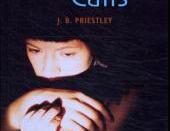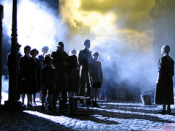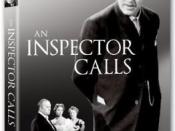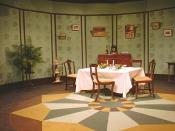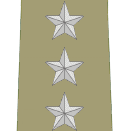The Role of the Inspector J.B Priestley's "ÃÂAn Inspector Calls' is a mysterious play written in 1945 but set in the year 1912, the Edwardian time prior to the first World War. The whole play is set in a large wealthy house owned by an upper middle class businessman; Mr Arthur Birling. The house is situated in a town called Brumley, an industrial city in Yorkshire. Mr Birling has a family that consists of his wife, Mrs Birling, his son Eric and his daughter Sheila as well as her husband to be, Gerald Croft, a son of a local business rival. The Birling household are sitting down to a dinner to celebrate the engagement of Sheila and Gerald, the mood is calm and cheerful, until Mr Goole the inspector arrives.
The entrance of the inspector is very important, Mr Goole shocks the family as they are in a content celebration.
Mr Birling begins to seem anxious and so he questions the inspector because he feels uneasy with not knowing the inspector. Mr Birling asks the inspector about him being recently transferred and talks about knowing people in high places, he says, "ÃÂ"ÃÂI was an alderman for years-and Lord Mayor two years ago- and I'm still on the bench- so I know the police officers at Brumley pretty well.'' Mr Birling is letting the inspector know he has power and tries to scare him as he his new. However, the inspector calmly answers as though he has ignored it, or isn't bothered by Mr Birling's power because he is there for one reason, After Mr Goole, the inspector, has listened to Arthur Birling brag about who he knows and his honours, he interrogates each and every one of the family about the death of a young girl who supposedly had various contacts with them separately. The reminiscences cause poignant regrets and guilt upon Sheila and Eric, the younger generation that will have an affect on the rest of the world through their lives.
J.B Priestley wanted Mr Goole to be more than just an inspector. He wanted the inspector to give a message to society about consequences of thoughtless decisions. He represents an image of Priestly or someone from the same era trying to help the next generation avoid war. Priestly wrote the play in 1945, after both world wars so he had seen what happens when people make ruthless choices, so to try and stop this he wrote a play. Priestley wrote this play intentionally as he saw an urgent need for social change and used the play to express his desire for social equality.
It shows how one man can prove to an entire family household that their insensitive mistakes have made a young girl take her own life.
The inspector seems to get more involved and emotional than any normal inspector. He begins to preach to the family about the young girl. "ÃÂ"ÃÂHer position now is that she lies with a burnt-out inside on a slab'' and when Mr Birling protests, the inspector replies, "ÃÂ"ÃÂDon't stammer and yammer at me again, man. I'm losing my patience with you people.'' This suggests the Birling family who represent the society do not understand the message from the future that is the inspector, so he feels frustrated. However, when he speaks to Sheila and Eric, they both feel remorse and so the inspector feels pleased with himself that he has got his message across. Following the inspectors exit, Sheila states "ÃÂ"ÃÂI behaved badly too. I know I did. I'm ashamed of it.'' Showing her sorrow and regret after Birling has ignored any sign and placed the guilt upon Eric and Sheila saying "ÃÂ"ÃÂThere's every excuse for what both your mother and I did- it turned out unfortunately, that's all.'' This shows the older generation will not change the society because they are narrow-minded whereas the younger generation see the have done wrong and will change their way.
Another idea for the inspector's role is that he could be an image of Eva Smith. Inspector Goole wants the Birling family to see what they have done to an innocent girl and how they have done it. At the end of the inspector's visit he makes an emotional speech that gives the idea he is an image of Eva Smith.
"ÃÂ"ÃÂBut just remember this. One Eva Smith has gone- but there are millions and millions and millions of Eva Smiths and John smiths still left with us, with their lives, their hopes and fears, their suffering and a chance of happiness, all intertwined with our lives, and what we think and do.'' Here Priestley made it obvious inspector Goole could be image of Eva Smith or another Eva or John Smith which he mentions in the speech. This too could be the explanation to why he got so emotional when Birling denied helping to kill Eva Smith. The inspector wanted everyone to feel remorse and guilt when he linked all the involvements of the family to the suicide of a young lady, maybe he was an image of that young lady.
The inspector's role in the play is evidently more than just an inspector, however we will never know Priestley's initial idea for Inspector Goole's role, so we have to search for our own ideas and thoughts that possibly did not even enter Priestley's head whilst writing the play. Conversely, Priestley could have had the same ideas, which have been discussed in the previous part of the essay and so we may have seen the true role of the inspector. The most likely role of the inspector is of him being an image of Preistley, expressing his thoughts and desire for social change. This is because there's more evidence suggesting this is his real role, such as the inspector's emotions and feelings towards some situations and Preistley's lifetime; living through both world Wars seeing what he did. Overall the inspector's role in the play "ÃÂAn Inspector Calls' is to express Priestley's thoughts on society.
Production notes If I had the chance to direct a film production of "ÃÂAn Inspector Calls' the set would be very important, however I would stay true to Preistley and keep the furniture and the set the same but change camera shots, music, lighting and choose a suitable actor to play the key role, the inspector. I would use a real set because it's a film, the dining table would be centre and a fireplace behind with a telephone upon a small table. All the furniture would be heavy and comfortable but not cosy and homelike. The inspector's entrance would be extremely mysterious for both the audience and the characters this would make them wary of the inspector and help get priestley's message across.
For the inspector's entrance I would undesirably leave out Edna, the maid's part out and the comments about the inspector so that inspector Goole can enter mysteriously and not have anyone notice him. His first line should be shot with an image of him in the mirror, with the reflection of candles burning and flickering beneath his cold pale face. The light would be dim so the Inspectors face should be in shadow so the audience don't know who he is, but after should take his hat off in a gentlemanly manner to reveal himself. Just as the camera goes to look at him, there should be a loud chilling tone that makes everyone, including the characters, aware of the inspector's presence. It will be mysterious because no one will know how the inspector enters the room. After being alerted by the inspector, Mr Birling would be in a frightened, hesitant mood so he would go on to ask the inspector who he is and his recent transfer. Throughout the play the inspector would stay calm, but when his message doesn't get received by some the Birling family she should get very emotional so that his message becomes clearer.
In my production, I would have Rodger Moore playing the part of Inspector Goole because he played James Bond; a character often in disguise, finding out more and going beyond the truth. He would wear traditional 1912 clothes, a smart dark suit with a long dark over coat and a hat that would contradict his pale face. Overall the inspector would be mysterious so that his message could be clearly seen and read by society.
